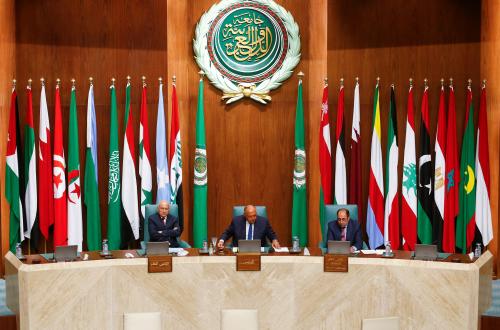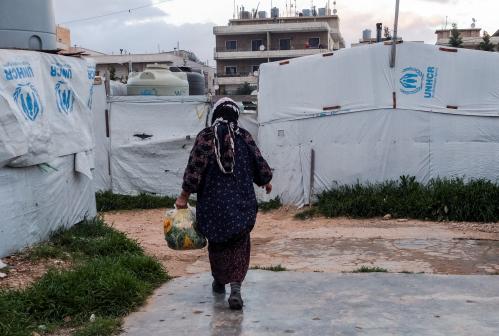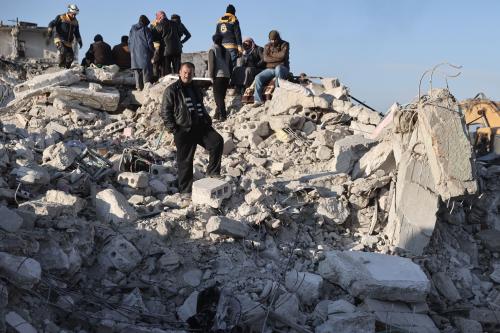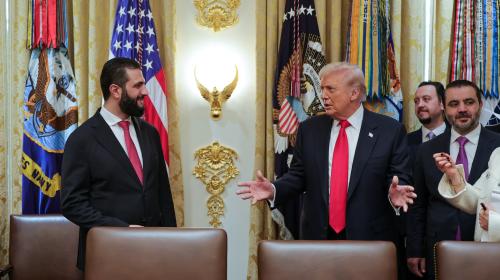In late May, Saudi Arabia appointed its first ambassador to Syria since it closed its embassy in Damascus 12 years ago. The Saudi ambassador’s return was only the latest step by the Arab states to normalize relations with the Assad regime. In 2018, the United Arab Emirates (UAE) became the first to reestablish ties with Damascus (though it only sent an ambassador to Syria in January 2024). The UAE’s move launched the rehabilitation of a regime that has been treated as a regional pariah since 2011 due to its brutal repression of mass protests. Other regional actors followed in its footsteps, including Jordan and Bahrain, but normalization only acquired real momentum in the wake of a devastating earthquake that hit southern Turkey and northern Syria in February 2023. Just months later, in May, the Arab League voted to restore Syria’s membership, ending a suspension dating back to 2011. In addition, several Arab states, including Jordan, Saudi Arabia, Iraq, Lebanon, and Egypt established an Arab Liaison Committee on Syria to negotiate Syria’s further return to the Arab fold, including, potentially, providing Syria with badly needed financial support. Since then, Syrian President Bashar al-Assad has again routinely participated in regional forums, including a November 2023 emergency summit on Gaza where he decried Israeli violence toward Palestinians—never mind his direct complicity in the brutal murder of hundreds of thousands of Syrian civilians.
Syria’s neighbors began normalizing their relations with Damascus after years of isolation and punitive sanctions failed to bring about a change in the Assad regime’s behavior, and as their concerns mounted about the spillover effects of Syria’s economic crisis for regional stability. Perhaps carrots, they argued, in the form of a step-for-step approach that would offer Assad incentives, might achieve what a policy heavy on sticks had not. Three issues loomed especially large on the Arab agenda: the need to create conditions that would permit the safe return of refugees; ending or at least curtailing the production and smuggling of Captagon, a narcotic that was flooding into Saudi Arabia and other Arab countries; and the possibility that a return to the Arab fold, along with Gulf money, might temper Iran’s influence in Syria.
A year later, what has normalization wrought? It has extended recognition and legitimacy to a murderous regime but in every other respect has been a failure. Arab regimes have taken unilateral steps with no reciprocal moves from Assad. Normalization led to no discernable progress toward the objectives sought by members of the Arab Liaison Committee. Refugees forced back into Syria from Lebanon are subject to detention and torture. The vast majority are unwilling to risk voluntary return. Huge quantities of Captagon continue to flow across Syria’s borders, with the direct support and involvement of leading regime figures including the president’s brother, Maher al-Assad. In the absence of any serious attempt by the regime to crack down on smuggling, Jordan has attacked production facilities inside Syria, shot down drug-carrying drones, and deployed its military to confront armed smuggling gangs that attempt to break through the border. Nor has a step-for-step strategy been any more effective in diluting Iranian influence in Damascus. In the face of Assad’s intransigence, last year’s cautious optimism has given way to a grim recognition of the limits of normalization and the depth of the Assad regime’s obstinacy. On May 7, 2024, one year to the day of the Arab League’s restoration of Syria’s membership, the Arab Liaison Committee on Syria suspended its meetings. While a future meeting in Baghdad has been announced, no date has been set.
Its failures notwithstanding, all indications are that Arab regimes are not yet prepared to rethink their engagement with the Assad regime. Instead, they have normalized normalization as a form of politics as usual. Not only did Saudi Arabia return a diplomatic delegation to Damascus in late May, but it also flouted U.S. sanctions to send Syria the spare parts it needed to keep its severely degraded fleet of civilian planes in the air. Flights between Damascus and Riyadh have also resumed. Indeed, as collective negotiations floundered, Arab regimes have shifted course, focusing instead on the development of bilateral ties to advance their particular interests. Even prior to Syria’s reinstatement to the Arab League, Oman and Syria established an Oman-Syria Joint Committee. Iraq’s prime minister, Mohammed Shia al-Sudani, visited Damascus in mid-2023—the first such visit in over 10 years—while Syria’s foreign minister, Faisal Mikdad, has more recently held discussions on strengthening bilateral ties with counterparts from Egypt, Bahrain, and the UAE.
While Syria continues to participate in regional summits, including the most recent Arab League meeting in Manama, there is little question that Assad prefers dealing with neighboring states on a bilateral rather than a multilateral basis. Not least, this approach enables Assad to prioritize his diplomatic outreach. Signaling his relative disregard for Jordan’s priorities—Amman has been an especially vocal critic of the Assad regime’s involvement with the Captagon trade and is said to have led efforts to suspend the work of the Arab Liaison Committee—Jordanian-Syrian ties have been cooler than those between the regime and the Arab states in the Gulf. None of this implies that neighboring regimes have set aside their deep distrust of Assad. Indeed, the Gulf regimes prefer to define their approach to Syria as engagement or non-isolation rather than normalization. For their part, Syrian officials quietly complain about the Gulf regimes’ refusal to provide substantial financial support to Damascus.
For those who view the isolation and sanctioning of the Assad regime as a necessary response to its conduct—its documented role in mass violence and crimes against humanity that include over 300 known uses of chemical weapons, its continued refusal to provide information on the fate of more than 125,000 detainees held in a prison system that Human Rights Watch has described as a “torture archipelago,” its systematic theft of property from the forcibly displaced, its role in the Captagon trade—normalization has shown itself to be a lose-lose outcome. It rewards the regime’s criminality, erodes prospects for accountability, and facilitates sanctions avoidance. If there is a long game lurking behind this “something for nothing” strategy, it has proven exceptionally elusive.
Moreover, persisting with normalization has pernicious consequences for regional and international actors. Neighboring governments working to reduce illicit narcotics flows will be stymied by the Assad regime’s refusal to crack down on the drug trade. Similarly, there is no reason to believe that the incentives held out in exchange for normalization will persuade the Assad regime to change course and create conditions conducive to the voluntary return of refugees. In both respects, Arab governments will pay a steep price for indulging in a normalization process that has been permissive to a fault in its courtship of the Assad regime. Beyond Syria’s neighbors, the rhetoric of normalization has given license for right-wing nativist leaders in Europe to press for the return of Syrian refugees and to reject Syrians’ asylum claims. In early June, officials from seven European countries—Austria, the Czech Republic, Cyprus, Greece, Italy, Malta, and Poland—asserted that conditions in the country had “evolved” sufficiently to reconsider the status of Syrian refugees. More recently, a German court ruled that Syria is now safe for refugee return, a finding that flies in the face of realities on the ground.
The obvious antidote to a strategy that bestows generous benefits on the Assad regime while gaining nothing in return is to stop it. It is time for regional governments to acknowledge the futility of normalization and change course. Along with the United States and its European partners, Syria’s neighbors need to reaffirm that the Assad regime will itself, directly, pay a steep price for its continued refusal to engage, whether on refugees, Captagon, or the larger issue of a pathway out of conflict consistent with U.N. Security Council Resolution 2254. The Assad regime is not normal. Its neighbors are poorly served by pretending that it is.
For its part, the United States would be well served by more assertive efforts to reverse normalization and affirm the Assad regime’s pariah status. The administration should move now, before a transition in January, to deploy the full range of diplomatic tools at its disposal—including more robust economic diplomacy through third-party sanctions—to more firmly signal its intent actively to throw sand in the gears of a deeply flawed normalization process. To date, the administration has instead largely conceded even the limited leverage that Congress gave it through the Caesar Syrian Civilian Protection Act. It has done little more than express skepticism about normalization while making clear it would do nothing to oppose it. In March 2023, Assistant Secretary of State for Near Eastern Affairs Barbara Leaf said that the administration’s message has been “If you’re going to engage with the regime, get something for that.” With the evidence of normalization’s failure, it is past time for the administration to get off the sidelines, recover whatever leverage it can muster, push back on Senate obstruction of the Assad Regime Anti-Normalization Act, and make much wider use of the sanctions that President Donald Trump signed into law through the Caesar Act to deter third-parties from engaging with the Assad regime. The alternative is a continued slow-drip restoration of the Assad regime’s standing that exposes forcibly repatriated refugees to the regime’s violence, even as it enables the continued flow of Captagon out of Syria and ensures the continued suffering of ordinary Syrians.
The Brookings Institution is committed to quality, independence, and impact.
We are supported by a diverse array of funders. In line with our values and policies, each Brookings publication represents the sole views of its author(s).








Commentary
Syria normalization: The failure of defensive diplomacy
August 2, 2024